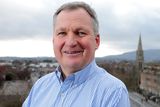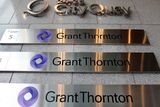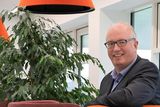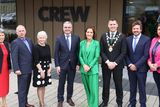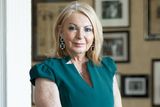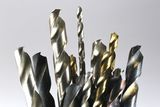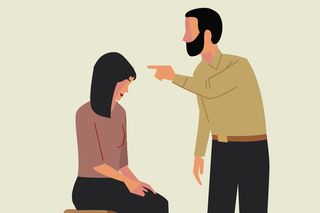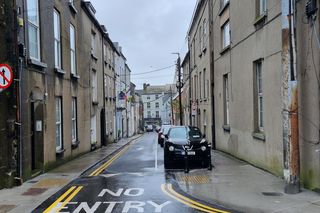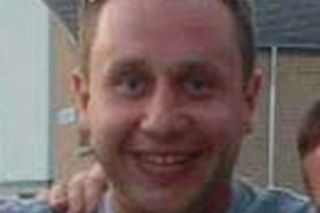From a Cork farm to Intel HQ
Cork's Margaret Burgraff is helping lead Silicon Valley giant Intel's charge to enable the internet of things. It's been quite a journey to the top floor.
Margaret Burgraff of Intel
Margaret Burgraff's grandfather sold land to Apple. He lived in a house beside the site where the factory was being constructed, at Hollyhill in Cork.
A young Burgraff watched the factory being put together when she visited. She didn't know what it would turn out to be - but she does remember thinking that she wanted to work there.
In 1994, she got her first job - in that factory. And just six weeks ago, she became vice president of Intel's software and services division, and co-general manager of the Intel service division.
It's a bit of a mouthful, but in essence it means she's in charge of enabling what the sector is calling the 'internet of things'.
But let's begin at the beginning: a young Burgraff watching Apple's shiny new factory being constructed.
"I remember looking at the glass, the green glass, and thinking: 'When I grow up I want to work there'. I wasn't sure what that was going to be a that time - it just looked like a cool building.
"Technology was the next big frontier, so that was pretty much what led to it. The youngest sister in my family has Down syndrome, and I remember as a kid always wondering what could help enable her, and I was always kind of thinking that technology would be the answer.
"I really liked playing Donkey Kong and Pacman and all of those other pretty primitive computer games that were around at the time - and I wanted to make a lot of money."
Burgraff (43) began working for Apple in 1994. She spent several years as an application programming interface test engineer, before moving to Apple's headquarters in Cupertino, California in 1998, as part of the launch of the first iMac desktop computer.
She was the quality manager for Apple's iBook product line from 1998 to 2005 and was senior quality manager for Apple Macintosh engineering products from 2005 to 2009. She was also involved in Apple's switch to Intel processors.
But the point came where Burgraff needed a new challenge.
"I felt as though I had learned as much as I could possibly learn about that world in that environment, so I was curious as to what's next.
"And I felt as though the way to really grow myself as a professional was to be somewhere else - to learn new tricks."
In 2009 she joined smartphone pioneer Palm. It was bought by Hewlett Packard in 2010. In 2011, she joined Intel as director of quality for the company's phone and tablet products. And last year she became a vice president of the company, in their mobile and communications arm.
It's all a long way from the farm in Cork on which Burgraff grew up. Only the faintest trace of her Irish accent remains.
But what about speed bumps along the way? Sexism in the tech world has received a lot of coverage in recent years. I'm curious - did Burgraff encounter any of this during her rise to the top?
"I'm not a victim. I've never seen myself as a victim of anything in my life. Of course there have been instances or one-off circumstances, but I believe that mostly it's kind of a knowledge of biases.
"The media portrayals of what an engineer was, or what a computer person was, that was very male for sure -not very cool and not very sexy. Most certainly it was not something that girls aspire to.
"Within my career, well from time to time, yes - when I walk into a room I immediately pretty much have to prove myself.
"I have had circumstances where I've gone into a difficult meeting, and in order to assert myself I'd pretty much put my resume out in front of everybody - to assure them that I deserved to be in the room.
"However, I've never let it hold me back, and I've been very successful in my career - so I'm not in a position to start crying and saying: 'It's doomed for women, and we can't get there.'
"I think Mary McAleese said that without both male and female, it's like a bird trying to fly with one wing. I do think that diversity is critical, for all sorts of reasons. We all bring something a little bit unique and different to the table.
"And I'm not talking about just gender diversity. What do I bring to the table as an Irish woman, who grew up on a farm, who had a younger sister and Down syndrome? All of the other experiences I've had in my life pretty much gear my mind towards thinking in a different way than a woman who grew up in LA.
"When Intel were engineering the Micah - that's a bracelet with a digital background on it - a lot of men started to work on this device for females.
"It wasn't until a female joined the team, when she came in to the room they were talking about charging. And of course most of the male engineers assumed that a sort of standard USB charger that you have for your phone is going to work for people's jewellery.
"And she came in and she said: 'You know, when I go to bed at night I throw all of my jewellery into a bowl'.
"And then the light switches came on with everybody - that a conductive bowl was what's best for charging this device. The guys would never have known that because they don't have their jewellery to throw into a bowl."
Technology has come to dominate our lives. Burgraff's job will help drive that forward as more and more devices become connected to the web - cars, televisions, medical equipment, household appliances, each of them sending data about your life to an internet company. It's a scary thought. Orwell's 1984 seems closer than ever. Is Burgraff worried?
"It does concern me that it may have a negative impact in the longer term. I worry about the written language when I see that everybody is texting all of the time and we're all using shorthand. I worry about safety when I see the location services on a lot of devices and some applications, which can track you to wherever you are and identify you to whoever has your number in their contacts book.
"That's not necessarily a safe thing - and some applications are just doing this by default right now. Me personally? I turn my location services off unless I need to use them.
"So I do worry about safety with data, and personal safety when it comes to technology. And now that we're going to the internet of things we're going to have a lot more connected devices, we're going to have a lot more security standards in place to protect us."
But Burgraff has a clear vision of the positive difference technology could make as well.
"We're starting to encounter a lot of sustainability issues with regard to our water here in California, it's a huge, huge problem. And I think that technology is going to be the way to look into global climate issues, into food technology and increasing the amount of food that we can get... personally, those are the things I'm more excited about than the baubles.
"I can't expose things that haven't already been announced... but the wonderful thing about working in a company like Intel is that every week I find out that we're working on something that I had no idea we were working on.
"Intel has technology wrapped around rhinoceroses' ankles in South Africa to help deal with poaching issues out there. Intel labs are always looking at the future issues and how to address some of those issues."
Next week Burgraff will be back in Ireland for the Irish Technology Leadership Group summit, being held across a series of venues in North Dublin. She says Ireland is almost an essential location for tech companies because of the competitive advantages this country enjoys.
And that should mean there'll be more Irish people following Burgraff to the top of Silicon Valley.
Join the Irish Independent WhatsApp channel
Stay up to date with all the latest news
